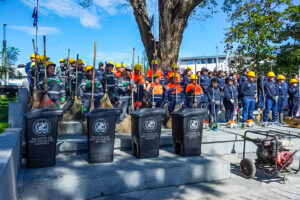The Minister of Labor and President of the Consejo Superior del Trabajo (CST), Rolando Castro, together with representatives of the labor and employer sectors, announced the formation of this tripartite body, which will be a key forum for social and labor dialogue in El Salvador. Diplomats, academics, and representatives of various institutions witnessed a process that was conducted in a transparent, participatory, and democratic manner.

The new council is made up of eight representatives from each sector: employer, worker, and government. The business sector was elected with the support of more than 74% of the trade associations, representing 95% of the national productive fabric, while the union election obtained 70% support from the labor sector. The voting took place at the end of july and was attended by observers from the accredited diplomatic corps, the Procuraduría General de la República (PGR), Procuraduría General de los Derechos Humanos (PDDH) and Corte de Cuentas de la República (CCR).

The CST board of directors agreed to formally establish the council in the last week of august, with the participation of the presidents of the various state bodies. Jorge Arriaza, CST vice president for the employer sector, stressed the importance of working together on the country’s economic development to avoid falling behind.
At its first session, the CST board signed a document requesting technical support from the International Labor Organization (ILO) for the functioning of the body. Castro said that this international support will strengthen the council’s work as the highest tripartite authority on labor matters in El Salvador.

The Consejo Superior del Trabajo is made up of the Council president, Minister of Labor and Social Welfare Rolando Castro; the vice president for the labor sector, Marta Campos; the vice president for the employer sector, Jorge Arriaza; eight full members from each sector (employer and worker) and eight alternate members from each sector.







